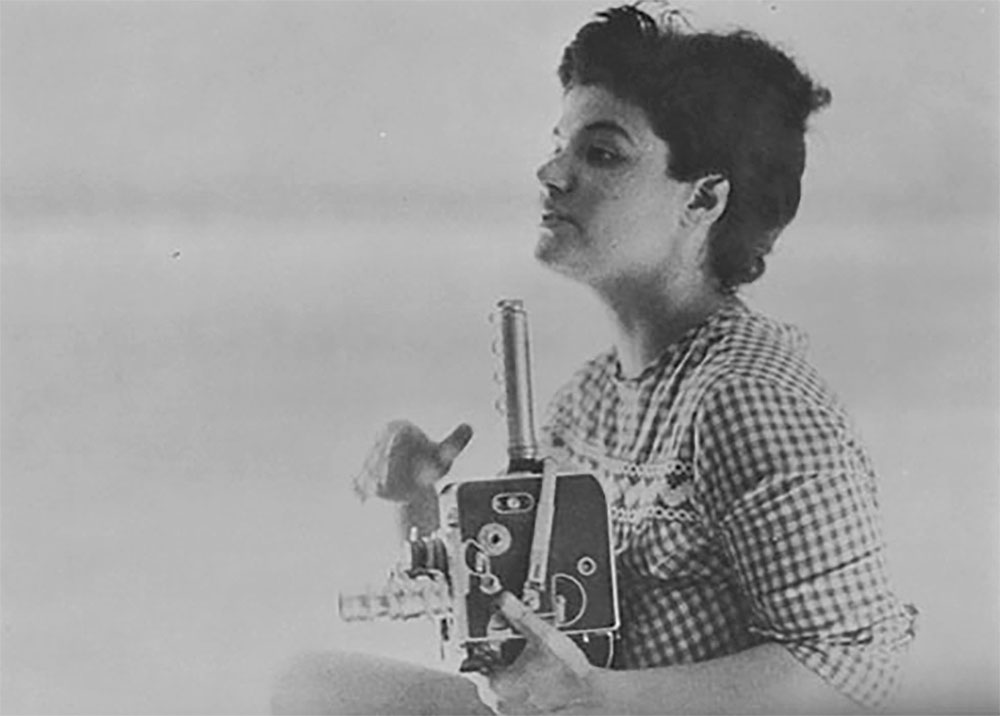Naomi Levine, who remains best known as Andy Warhol’s first female superstar, was a pivotal figure in the 1960s New York underground film scene whose numerous achievements have been obscured by time. She was a close friend of both Warhol and Jack Smith, having starred in the former’s early two-reelers. In 1963, this included a performance as Jane in Tarzan and Jane Regained… Sort Of. But she was also a painter and created a series of celebrated experimental films that encapsulated her era’s avant-garde with their poetic formalism, free-spirited energy, and communal ethos. The latter reflected the deeply collaborative work of her contemporaries.
After disappearing in the 1980s, Levine withdrew all of her films from distribution. My first encounter with her work came about a few years ago in the form of a brief mention in Wheeler Winston Dixon’s The Exploding Eye: A Re-Visionary History of the American Experimental Cinema. The reference to her “rigorously beautiful films” was so slight, tacked on at the end of Charles I. Levine’s entry, that her inclusion almost felt like an afterthought. At the time, I estimated my chances of ever seeing her films was at less than 1%.
Thanks to Anthology Film Archives, who recently preserved two of Levine’s lost films—Yes (1963) and Jeremelu (1964)—I was finally able to see her films at a press screening last week. These films will screen alongside Jonas Mekas’s Walden: Reel 3 (1969), which mainly consists of a visit to Ken and Flo Jacobs’s loft that Mekas made with Levine. Both of the Levine films being screened received high praise from illustrious experimental filmmakers such as Gregory J. Markopoulos and Mekas upon release. Markopoulos, who dismissed most notable filmmakers in his writing, claimed Jeremelu should have won the top prize at the 1965 Ann Arbor Film Festival in an article aptly titled “Denunciation of the Ann Arbor Film Festival.” Mekas, in his typical hyperbolic style, described Yes as “no other movie you ever saw.” Watching Yes, I couldn’t help but think of several other films from the era, particularly the lyrical superimposition-heavy films of Will Hindle and the visual tapestries of Ron Rice’s Chumlum (1963), so I’m not entirely sure what Mekas was getting at with that remark. Then again, Jeremelu, which Levine herself described as a less-than-three-minute “exercise in film editing,” is a perfectly fine formal doodle at best, so I’m not entirely sure what Markopoulos was on about either. (That said, it does boast a blink-it-and-you’ll-miss-it cameo from Gerard Malanga’s penis.)
Yes exists in a strange, dreamlike space where jangly sitar music serves as a constant backdrop—the kind that plagued many ‘60s experimental films and was meant to evoke mysticism, but feels hopelessly cheesy. Black-and-white shots of shrubbery and plants gradually dissolve into more abstract compositions, with the film’s most striking visual feature being the use of superimposed patterns and textures. Despite the ethereal quality of the edited footage—this is unabashed, very of its time, flower power hour—it’s also a hippie soirée through and through, with Levine’s naked friends and their naked children wandering freely through a serene, pastoral landscape. One striking moment comes halfway through when the film’s crew of collaborators, identified at the start as “friends,” slowly walk into a barn and step out from what seems to be blinding white light. In the latter half of Yes, a childlike voice-over emerges, reciting lines about eating various things: strawberries, dots (accompanied by a close-up of dots on a woman’s dress), “every scent in the world,” and “yes and sometimes no.” The film’s final image, an extreme close-up of a dandelion’s fuzzy seed head, lingers for some time—the type of “small and personal” gesture that would make Mekas absolutely lose it. Though not on the level of his rave, Yes shows promise. We can only hope that one of Levine’s ten other films, all of which are also considered lost, play one day as well.
Naomi Levine runs from January 16 - 19 at Anthology Film Archives.



